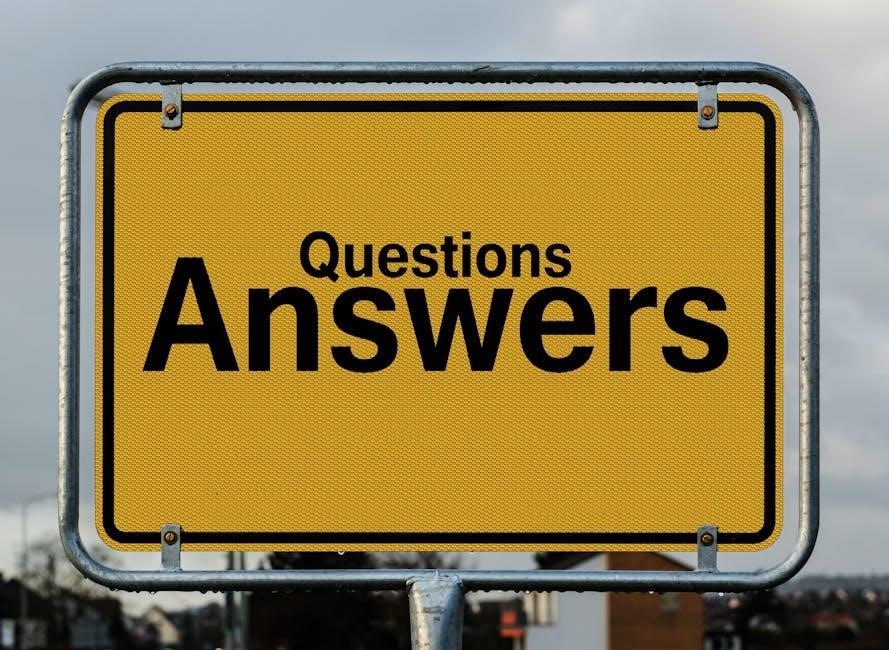70 toughest interview questions and answers pdf
The 70 Toughest Interview Questions and Answers PDF is a valuable resource for job seekers, offering a comprehensive guide to mastering challenging interviews. It includes 70 carefully curated questions, detailed answers, and expert tips to help candidates excel. This document is designed to prepare individuals for various interview scenarios, ensuring confidence and success in securing their dream roles.
From personal background queries to decision-making dilemmas, this PDF covers a wide range of topics. It provides actionable strategies and real-world examples, making it an essential tool for anyone aiming to ace their interviews and stand out in a competitive job market.

Breakdown of the 70 Toughest Interview Questions
The 70 Toughest Interview Questions are divided into key categories, including personal background, strengths, weaknesses, decision-making, teamwork, leadership, and future aspirations. Each section provides realistic scenarios and tips for effective responses.
From behavioral to technical questions, this breakdown ensures candidates are well-prepared for diverse interview topics, helping them articulate their skills and experiences with confidence and clarity in high-pressure situations.
Personal Background Questions
Personal background questions are foundational in interviews, allowing employers to understand a candidate’s identity, education, and career journey. These questions often include prompts like, “Tell me about yourself,” “Why did you choose your field?” or “What motivated you to pursue your current career path?”
Such inquiries help interviewers assess how well a candidate aligns with the company’s culture and values. For example, a question like, “Why should we hire you?” requires a concise yet impactful response highlighting one’s unique strengths and experiences. Additionally, questions about education, such as “What was your favorite subject in college?” or “How did your studies prepare you for this role?” are common.
Answering these questions effectively involves balancing professionalism with authenticity. Candidates should prepare brief, structured responses that showcase their qualifications and passion. For instance, when discussing career choices, linking personal interests to professional goals demonstrates purpose and direction. Overall, personal background questions set the tone for the interview, making them crucial for creating a positive first impression.

Greatest Strengths and Weaknesses
Questions about your greatest strengths and weaknesses are among the most common yet challenging in interviews. These queries require candidates to self-reflect and present their traits in a way that aligns with the role. For example, “What is your greatest strength?” or “What is your biggest weakness?” are frequently asked to gauge self-awareness and honesty.
When discussing strengths, it’s important to link them to specific skills or experiences that demonstrate value. For instance, “My ability to work under pressure and meet deadlines has consistently helped me deliver high-quality results.” For weaknesses, candidates should focus on areas they are actively improving, such as, “I sometimes tend to be a perfectionist, but I’ve been working on prioritizing tasks to maintain efficiency.”
These questions also reveal how well a candidate can articulate their self-awareness and growth mindset. Employers seek individuals who can acknowledge areas for improvement while showcasing their positive attributes. By balancing honesty with diplomacy, candidates can present themselves as both authentic and capable of growth.
Decision-Making and Problem-Solving Scenarios
Interview questions about decision-making and problem-solving are designed to evaluate your ability to think critically and handle challenging situations. These scenarios often require you to provide specific examples from your past experiences. For instance, questions like, “Can you discuss a situation where you had to make a difficult decision at work?” or “Describe a challenging problem you faced and how you resolved it,” are common in tough interviews.
When answering these questions, it’s essential to demonstrate logical thinking and a structured approach to problem-solving. The STAR technique (Situation, Task, Action, Result) is highly recommended for organizing your responses effectively. For example, you might describe a time when you faced a tight deadline and explain how you prioritized tasks, collaborated with your team, and delivered a successful outcome.
Employers are looking for evidence of your ability to analyze problems, weigh options, and make sound decisions under pressure. Highlighting your leadership skills and willingness to take initiative in such scenarios can significantly strengthen your candidacy. By sharing detailed, real-world examples, you can showcase your problem-solving prowess and decision-making acumen, making you a more attractive candidate to potential employers.

Teamwork and Leadership Experiences
Questions about teamwork and leadership experiences are crucial in interviews, as they reveal your ability to collaborate, inspire, and manage others; Employers want to understand how you contribute to group dynamics and how you handle leadership roles. Common questions include, “Can you describe a time when you led a team?” or “How do you handle conflicts within a group?”
When answering, focus on specific examples that highlight your leadership skills and teamwork abilities. Use the STAR technique to structure your responses: describe the situation, outline the tasks involved, explain the actions you took, and share the results. For instance, discuss how you motivated a team to meet a tight deadline or how you mediated a disagreement to ensure project success.

Emphasize soft skills like communication, delegation, and emotional intelligence; Show how your actions contributed to the team’s success and how you fostered a positive work environment. Highlighting your ability to lead by example and inspire others will demonstrate your value as a potential leader and team player.
- Be specific about your role and contributions.
- Illustrate how you supported your team members.
- Quantify achievements where possible (e.g., “increased productivity by 20%”).
By showcasing your teamwork and leadership experiences effectively, you can convince employers of your readiness to take on responsibilities and thrive in collaborative environments.
Future Aspirations and Career Goals
Questions about future aspirations and career goals are designed to assess your long-term vision and alignment with the company. Employers want to understand your motivations, ambitions, and how you see yourself growing within their organization. Common queries include, “Where do you see yourself in five years?” or “What are your long-term career goals?”
When responding, focus on demonstrating how your personal aspirations align with the company’s mission and growth trajectory. Avoid vague answers; instead, provide specific, achievable goals that show you’ve thought about your career path. For example, you might express a desire to take on leadership roles or specialize in a particular area of expertise.
Highlight your commitment to continuous learning and professional development. Emphasize how you plan to contribute to the organization’s success while advancing your own skills. Be realistic but optimistic, showing that you are proactive about your future and eager to make an impact.
- Align your goals with the company’s vision.
- Highlight your desire for growth and learning.
- Be specific about your aspirations and how they fit with the role.
By clearly articulating your future aspirations, you can reassure employers of your long-term commitment and potential to contribute meaningfully to their organization.

Tips for Answering Tough Interview Questions
Use the STAR technique to structure responses, balancing honesty with diplomacy. Prepare thoroughly, researching common questions and practicing answers. Show confidence without appearing arrogant, and align your responses with the company’s values and goals to create a positive impression.
- Stay calm and composed under pressure.
- Provide specific examples from your experience.
- Highlight skills and achievements relevant to the role.
These strategies ensure clarity, professionalism, and a strong showcase of your qualifications, helping you navigate even the toughest inquiries effectively.
Using the STAR Technique
The STAR technique is a highly effective method for answering tough interview questions. It stands for Situation, Task, Action, and Result, providing a clear structure to showcase your skills and experiences. By breaking down your response into these four components, you ensure clarity and conciseness, making it easier for interviewers to understand your role and achievements.
- Situation: Briefly describe the context of the story, setting the scene for your experience. For example, “In my previous role, we faced a tight deadline to launch a new product feature.”
- Task: Explain your specific responsibility or challenge within that situation; For instance, “My task was to lead the development team and ensure timely delivery.”
- Action: Detail the steps you took to address the challenge. Focus on your contributions, such as, “I implemented agile methodologies to streamline the process and assigned clear tasks to team members.”
- Result: Highlight the outcome of your actions, emphasizing quantifiable achievements. For example, “We successfully launched the feature two days ahead of schedule, receiving positive feedback from clients.”
Using the STAR technique ensures your answers are structured, professional, and impactful. It helps you stand out by demonstrating your problem-solving skills and ability to deliver results, making it a powerful tool for tackling tough interview questions effectively.
Balancing Honesty with Diplomacy
When answering tough interview questions, it’s crucial to strike a balance between honesty and diplomacy. Being truthful about your experiences and weaknesses is essential, but it’s equally important to present your responses in a way that reflects professionalism and positivity. For example, when discussing a past mistake, avoid oversharing or sounding overly negative. Instead, frame the situation as a learning opportunity, highlighting what you gained and how you’ve grown.
Similarly, when asked about challenging colleagues or difficult decisions, focus on the solution rather than the conflict. Use phrases like, “I learned the importance of clear communication” or “I focused on finding a collaborative solution.” This approach shows maturity and resilience without sounding dismissive or unprofessional.
Diplomacy also applies when discussing reasons for leaving a previous job. Avoid criticizing former employers or colleagues. Instead, emphasize your desire for growth, new challenges, or alignment with the company’s values. This approach maintains a positive tone while being honest about your aspirations.
By balancing honesty with diplomacy, you create a favorable impression, demonstrating both integrity and tact. This skill is particularly valuable in interviews, as it showcases your ability to navigate complex situations gracefully and professionally;

Common Mistakes to Avoid in Interviews
Overconfidence and lack of preparation are common pitfalls that can derail an interview. Avoid speaking negatively about past employers or colleagues, and refrain from exaggerated claims about your abilities. Poor body language and lack of research about the company can also leave a negative impression. Stay focused, honest, and professional to ensure success.
Overconfidence and Lack of Preparation
Overconfidence and a lack of preparation are two of the most common mistakes candidates make during interviews. While confidence is essential, it can backfire if it comes across as arrogance. Candidates who overemphasize their strengths without providing specific examples often fail to impress. Similarly, a lack of preparation can lead to vague or unstructured responses, making it difficult to showcase one’s qualifications effectively.
One of the key reasons candidates fall into this trap is failing to research the company or practice common interview questions; Without a clear understanding of the role or the organization, it becomes challenging to align their experiences with the job requirements. Overconfidence can also lead to oversharing irrelevant information or speaking negatively about previous employers, which raises red flags.
To avoid these mistakes, candidates should strike a balance between confidence and humility. Being prepared involves not only researching the company but also practicing answers to tough questions using techniques like STAR (Situation, Task, Action, Result). This ensures responses are concise, relevant, and impactful. Additionally, staying humble and acknowledging areas for growth can create a positive impression.
By addressing these common pitfalls, candidates can present themselves as capable and thoughtful professionals, significantly improving their chances of success in interviews.

Importance of the 70 Toughest Interview Questions PDF

Importance of the 70 Toughest Interview Questions PDF
The 70 Toughest Interview Questions and Answers PDF is an indispensable resource for anyone preparing for challenging job interviews. It bridges the gap between preparation and performance by providing candidates with a comprehensive understanding of the types of questions they may face. This guide is particularly valuable in today’s competitive job market, where standing out requires more than just qualifications—it demands the ability to communicate effectively and showcase skills persuasively.
This PDF fills a critical gap by offering not just questions but also detailed answers and strategies for addressing them. It equips candidates with practical insights into how to approach difficult scenarios, whether they involve personal background, strengths and weaknesses, or decision-making. The structured format ensures that users can practice and refine their responses, building confidence and reducing anxiety.
By focusing on real-world examples and actionable advice, the PDF empowers candidates to present themselves as capable and thoughtful professionals. It serves as a roadmap for navigating even the most daunting interviews, ultimately increasing the likelihood of securing their desired role.

How to Prepare Effectively for Tough Interviews
Preparing effectively for tough interviews requires a strategic and organized approach. Start by thoroughly researching the company, role, and industry to understand their expectations and challenges. Utilize resources like the 70 Toughest Interview Questions and Answers PDF to familiarize yourself with potential questions and practice crafting concise, impactful responses.
Focus on mastering the STAR Technique ( Situation, Task, Action, Result) to structure your answers, ensuring clarity and relevance. Conduct mock interviews with friends or mentors to simulate real scenarios and refine your delivery. Self-assessment is key—identify your strengths and weaknesses to address them confidently during the interview.
Additionally, stay updated on industry trends and current events, as interviewers often incorporate these topics. Review your resume and be ready to discuss your experiences in detail. Practice active listening and develop thoughtful questions to ask the interviewer, demonstrating your engagement and interest. By combining thorough preparation with a positive mindset, you can approach tough interviews with confidence and increase your chances of success.
From personal background inquiries to complex problem-solving questions, the guide covers a broad spectrum of topics, ensuring that candidates are well-prepared for any direction the conversation may take. The inclusion of expert tips and strategies, such as the STAR Technique, further enhances its practicality, offering readers a clear framework for delivering polished and professional answers.
Ultimately, this PDF is not just a list of questions and answers but a roadmap to success. It empowers individuals to approach interviews with poise and assurance, knowing they have the tools to stand out in a competitive job market. Whether you’re a recent graduate or an experienced professional, this guide is essential for achieving your career aspirations.

